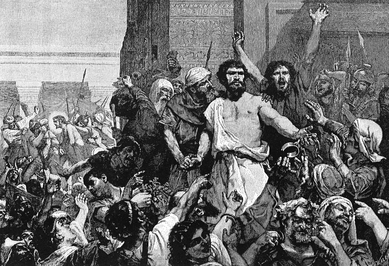|
1/29/2015 Comments Jesus bar Abbas: a RevolutionaryBy: Kirby Franklin  The similarities are striking. Many, if not all, Christians know of Barabbas as the murderer released on the Passover, (as per tradition), in replace of the Governor Pontius Pilate's first choice, Jesus. However, what many do not as readily know, is the strange, almost intentional, similarities between Jesus and Barabbas. Not much is known of Barabbas, however, in Mark 15:7 it tells us exactly who he was; [he] was in prison with the insurrectionists who had committed murder in the uprising. Barabbas was not just a common criminal, or violent murderer as we are often told, and as so many people have been led to accept. Barabbas was actually a revolutionary. A zealot, who stood up for his people against an oppressive government of racially biased, and wealth consumed, God-haters. One of Jesus' own disciples, Simon, was a zealot before he became a follower of the Christ, and it's quite possible he knew Barabbas. Even more possible, Barabbas may have known of Jesus, due to his reputation. But what we do know, is that Barabbas was a political prisoner of the Empire, caught during a riot, or an uprising, and sentenced to death for his "crimes." The similarities, to me, are far more than coincidence. Especially when you learn that many early manuscripts of Matthew, called Barabbas, Jesus bar Abbas. Quite literally "Jesus, son of the Father." No, I think there is a lot to be grasped here. When Jesus Christ entered Jerusalem on palm Sunday, the people were in love with him. He was a rockstar. He was their hero. They thought he was their king. Despite all of his riddles, and his teachings, they thought Jesus was the one who was going to physically remove the Romans from Palestine. But Jesus is a God-man of Peace. He clearly taught these principles of non-violent, shame resistance, in response to the Empire, and its laws. When Jesus said if a man hits you on right cheek, turn to him your other, he wasn't just saying "give him another shot." The only way to hit a person on the right cheek was with your left hand, or the back of your right. And since the left was considered unclean, and would never be used for any social interaction (not even slaves), the backhand is most likely. Imagine how a backhand slap would be used. An insulting, and dishonoring way between a servant and his master, or a guard and his prisoner. Jesus was teaching us to not only resist retaliation, but force them to feel shame by committing this act again. This is something that Barabbas did not understand. His violent uprising, alongside many in the Jewish nation, led to his committing murder in the name of justice, and eventually his arrest. I speculate that Simon was one of his cohorts in the past, and perhaps was a quick learner of Jesus, one who realized the real implications of murder, no matter what the reason. And due to his new found understanding, left the Zealot movement. Barabbas did not, and instead, continued on the path that led him to Pilate. The people on palm Sunday did not, or could not, understand Jesus' actual message. They wanted a Messiah who conquered, and reigned on a throne. Jesus is not that Messiah. They wanted a King who ruled, and ravaged their oppressors, and enemies. Jesus is not that king. When Jesus was arrested by the Romans, I'm sure many Jews thought, this is the time he will rise. But Jesus chose no action. He chose non-resistance. He chose not to fight back, not to speak, and not to defend his actions. This was not the Messiah the Jews wanted. And they were angry. Many scholars say that the Pharisees planted people in that crowd, to use mob-psychology, and have Jesus crucified. I have come to think that the people who thought Jesus was a ruler, and a King, realized he wanted to be neither, and were angry. They saw their Messiah as failing them, perhaps even viewed Barabbas as a likely replacement, and demanded Jesus be executed. The Jews had a choice. A peace loving God-man, who chose a path of a wandering ascetic, teaching us how to love one another, healing the ill, and feeding the destitute. One who spent his days with drug-addicts, and homeless; spent his nights on dirt floors of strangers, and ate food he found in fields or from passersby. Yes he stood up against the oppressor, but not in a way that would immediately relieve the tyrannical grip of the Iron Empire. Or a man, oppressed, angry, and indignantly justified, to fight back against the Romans. A man who stood up against the oppressor and did what was necessary, to free his people. A man who killed for his country. A man who stood for freedom, and justice, at the cost of murder, and violence. And the oppressed people made the "obvious choice." This brief study for me has reinforced the message of passive resistance to violence, and an informed resistance against the Empire and it's war-fighters. It has reinforced my belief, that the Empire of man will always choose the violent path, be it for justice, or wealth, or any reason you may find. No matter the reason, mankind will desire Barabbas, because they do not see Jesus as relevant, or strong. They do not understand that peacemaking, and peace-keeping, are more powerful weapons against the enemy than any drone, and more effective than any nuclear weapon. Justified, violent resistance is often a reaction in both personal, and national mindset. But as Followers of the One, Jesus, we must heed his call to peace making. Jesus is not a wide cast net. His message will not change the system from above. It changes the foundation, one brick at a time.
Comments
|
Disclaimer
The viewpoints expressed in each reader-submitted article are the authors own, and not an “official Jesus Radicals” position. For more on our editorial policies, visit our submissions page. If you want to contact an author or you have questions, suggestions, or concerns, please contact us. CategoriesAll Accountability Advent Anarchism Animal Liberation Anthropocentrism Appropriation Biblical Exegesis Book Reviews Bread Capitalism Catholic Worker Christmas Civilization Community Complicity Confessing Cultural Hegemony Decolonization Direct Action Easter Economics Feminism Heteropatriarchy Immigration Imperialism Intersectionality Jesus Justice Lent Liberation Theology Love Mutual Liberation Nation-state Nonviolence Occupy Othering Pacifisim Peace Pedagogies Of Liberation Police Privilege Property Queer Racism Resistance Resurrection Sexuality Solidarity Speciesism Spiritual Practices Technology Temptation Veganism Violence War What We're Reading On . . . White Supremacy Zionism ContributorsNekeisha Alayna Alexis
Amaryah Armstrong Autumn Brown HH Brownsmith Jarrod Cochran Chelsea Collonge Keith Hebden Ric Hudgens Liza Minno Bloom Jocelyn Perry Eda Ruhiye Uca Joanna Shenk Nichola Torbett Mark VanSteenwyk Gregory Williams Archives
October 2017
|
Search by typing & pressing enter


 RSS Feed
RSS Feed